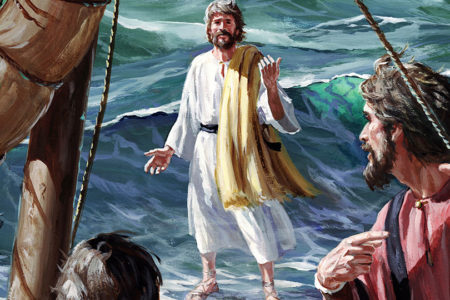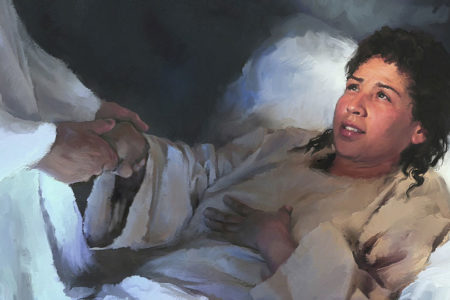The Wisdom of God Conclusion
Daniel and the Handwriting on the Wall
The previous article focused on God’s distribution of wisdom to Daniel after he was taken captive to Babylon. God gave Babylonian King Nebuchadnezzar a dream that disturbed him so much he could not sleep. Then God revealed to Daniel the dream’s content and meaning.
This article explains two more tests of the wisdom God gave Daniel. After Daniel described the king’s dream and its interpretation, Nebuchadnezzar was so impressed he “fell on his face, prostrate before Daniel” and said, “Truly your God is the God of gods, the Lord of kings, and a revealer of secrets, since you could reveal this secret” (Dan. 2:46–47). Then he made Daniel ruler over the whole province of Babylon and chief administrator over all the kingdom’s wise men (vv. 48-49).
Daniel’s Second Test of Wisdom
Later King Nebuchadnezzar had another dream that frightened him (4:4–5). Because his pagan wise men could not interpret it, he asked Daniel to tell him the dream’s meaning. He told Daniel, “The Spirit of the Holy God is in you, and no secret troubles you” (v. 9).
Nebuchadnezzar’s dream was about a huge, strong tree that grew to the heavens and provided food for all living things. A holy being from heaven commanded the tree be chopped down and its branches cut off, but its stump and roots be left in the ground and bound with a band of iron and bronze. The voice from heaven then declared, “Let his heart be changed from that of a man, let him be given the heart of a beast, and let seven times pass over him” (vv. 10–16).
The purpose of the dream was “that the living may know that the Most High rules in the kingdom of men, gives it to whomever He will, and sets over it the lowest of men” (v. 17).
Nebuchadnezzar restated his earlier directive to Daniel: “Declare its interpretation,” for “you are able, for the Spirit of the Holy God is in you” (v. 18).
Daniel explained that the huge, strong tree represented the king in his impressive greatness and ruling authority over extensive areas of the earth (vv. 20–22). The cutting down of the tree indicated Nebuchadnezzar would be cut off from ruling. The binding of the stump with bands of iron and bronze meant he would be bound with mental illness that would change his heart to that of a beast. He would be driven from his throne to graze in the open field with the animals, eat grass, and be wet with dew.
The condition would last for a period of “seven times” until Nebuchadnezzar acknowledged that “the Most High rules in the kingdom of men, and gives it to whomever He chooses” (vv. 23–25).
The command to leave the tree’s stump and roots in the ground meant that, after Nebuchadnezzar acknowledged “that Heaven rules,” his kingdom would be restored to him (v. 26).
The Dream’s Fulfillment. The dream was fulfilled 12 months after Daniel interpreted it. Nebuchadnezzar was walking about the royal palace of Babylon, boasting, “Is not this great Babylon, that I have built for a royal dwelling by my mighty power and for the honor of my majesty?” (vv. 28–30).
While he was speaking, a voice from heaven declared,
King Nebuchadnezzar, to you it is spoken: the kingdom has departed from you! And they shall drive you from men, and your dwelling shall be with the beasts of the field. They shall make you eat grass like oxen; and seven times shall pass over you, until you know that the Most High rules in the kingdom of men, and gives it to whomever He chooses (vv. 31–32).
Immediately, “he was driven from men and ate grass like oxen; his body was wet with the dew of heaven till his hair had grown like eagles’ feathers and his nails like birds’ claws” (v. 33).
Nebuchadnezzar’s Restoration. At the end of the appointed time, Nebuchadnezzar looked to heaven. His understanding returned to him; and he blessed, praised, and honored the Most High, everlasting God who is sovereign over the angels of heaven and all the inhabitants on Earth and who answers to no one (vv. 34–35).
The king was restored to his kingdom (v. 36) and pronounced the following benediction to God, whom Daniel introduced to him: “Now I, Nebuchadnezzar, praise and extol and honor the King of heaven, all of whose works are truth, and His ways justice. And those who walk in pride He is able to put down” (v. 37).
Daniel’s Third Test of Wisdom
Nebuchadnezzar died on October 7, 562 BC.1 After three other men ruled, Nabonidus became king of Babylon in 556 BC.2 In 555 BC he marched an army westward to conquer rebels who had revolted against Babylonian rule since Nebuchadnezzar’s death. Before leaving Babylon, Nabonidus entrusted “kingship” to his eldest son, Belshazzar.3
Eventually, Nabonidus built a royal palace in a distant town of the Arabian peninsula and settled there.4 As a result, Belshazzar became the real authority in Babylon, the capital city of the Babylonian kingdom.5
Belshazzar’s Feast. Belshazzar hosted a huge feast for 1,000 of his officials (5:1). He sat on an elevated platform where everyone could see him.6
After he got drunk, he demanded the vessels captured from Jehovah’s Temple be brought to him from the Temple of Marduk, Babylon’s chief pagan god. Belshazzar intended to use Jehovah’s sacred vessels to praise the Babylonian gods while getting even drunker with his nobles, wives, and concubines.
Since the Temple of Marduk also held the sacred vessels of other conquered peoples, it appears Belshazzar chose to desecrate the vessels of Israel’s God for three specific reasons:
- Belshazzar would have known it was Israel’s God who gave King Nebuchadnezzar the dream that foretold the Babylonian kingdom’s conquest by the Medo-Persian empire.
- Ancient sources reveal that Medo-Persian troops conquered the city of Babylon’s environs four months before Belshazzar’s feast.7 Babylonian officials at the feast had fled to the fortress city of Babylon as the Medo-Persian army advanced. Thus, when Belshazzar defiled Jehovah’s vessels, the people whom God had foretold would capture Babylon were already encamped outside. The capital city was cut off from help.
- Nebuchadnezzar had made his capital “the world’s mightiest fortress.”8 The outer wall was so thick that no weapons could penetrate it. A second inner wall with fortress towers and ramparts made scaling it suicidal.9 Because the walls straddled the Euphrates River, the city had a constant supply of water.10 In addition, it was stocked with enough food to feed its population for more than 20 years.11 Ancient historians claimed these impressive preparations prompted the Babylonians to laugh at the Medo-Persian siege of their city.12
Consequently, it appears Belshazzar purposely chose to mock the God of Israel by showing his contempt for Him, His sacred vessels, and the dream He gave Nebuchadnezzar.
The Handwriting on the Wall. Suddenly the detached fingers of a man’s hand appeared. They wrote three words near the top of a wall easily visible to Belshazzar and his guests.
The king became so frightened his face grew pale, his hip joints went slack, and his knees began to knock. He screamed for his wise men, but they could neither read nor interpret the writing, creating mass confusion for Belshazzar and his officials (vv. 5–9).
The Queen Mother’s Suggestion. Hearing of the confusion in the banquet hall, the queen mother arrived and urged Belshazzar to summon Daniel to read and interpret the writing (vv. 10–12).
Daniel’s Appearance. So the king called for Daniel. Before Daniel interpreted the writing, he told Belshazzar that, by desecrating Israel’s sacred vessels, he had exalted himself against the very God who had humbled Nebuchadnezzar. Because of Belshazzar’s arrogant contempt, God sent the mysterious fingers to write the ominous message (vv. 13–24).
Daniel’s Interpretation. The mysterious words were MENE, MENE, TEKEL, UPHARSIN. His interpretation was as follows: MENE meant “numbered” or “reckoned.”13 It indicated God had numbered the days of Belshazzar’s kingdom and had reckoned that those days had come to their end.14 This word was written twice for emphasis.15
TEKEL meant “weighed.”16 God had weighed Belshazzar in His balances and found him deficient in moral worth.17
PERES meant “broken” or “divided.”18 It implied God would shatter Belshazzar’s kingdom and give it to Medo-Persia (vv. 25–28).
The End of Belshazzar and Babylon. King Cyrus of Medo-Persia knew Babylon’s defenses would prevent his troops from entering the city. He would need a unique strategy. So on October 13, 539 BC,19 the night of Belshazzar’s feast, the Medo-Persians diverted the Euphrates River from its normal channel under the city’s walls. When the water was shallow enough to ford, they entered the river channel and walked underneath the walls into the city. They went directly to Belshazzar’s banquet hall and killed him and many of his officials.20
The Babylonians were caught by surprise. Before they knew what was happening, the great city of Babylon had fallen to Medo-Persia without a major battle or destruction.21
ENDNOTES
- A. T. Olmstead, History of the Persian Empire (Chicago, IL: University of Chicago Press, 1959), 35.
- Edward J. Young, The Prophecy of Daniel (Grand Rapids, MI: Eerdmans, 1970), 298.
- Olmstead, 37.
- Ibid., 38.
- Ibid.
- Young, 118-19.
- Charles Boutflower, In and Around the Book of Daniel (Grand Rapids, MI: Zondervan, 1963), 121–132.
- Olmstead, 39.
- Ibid., 35.
- Boutflower, 122–23.
- Ibid., 122, 124.
- Ibid.
- Leon Wood, A Commentary on Daniel (Grand Rapids, MI: Zondervan, 1973), 149.
- Ibid.
- Young, 125.
- Wood, 149.
- Ibid., 150.
- Ibid.
- Olmstead, 50.
- 20 Boutflower, 124–125.
- Ibid., 122–125









Why would God give a new born again. Christon of one year a dream the hand writing on the Wall. Just the hand writing Mene Mene. Was not with the bible or even knew that was in the bible. I have ask Christian n prayed about it. This is over 35 yrs ago. Just curious . I don’t have a kingdom. ( so to speak ) My [email protected] God Bless!